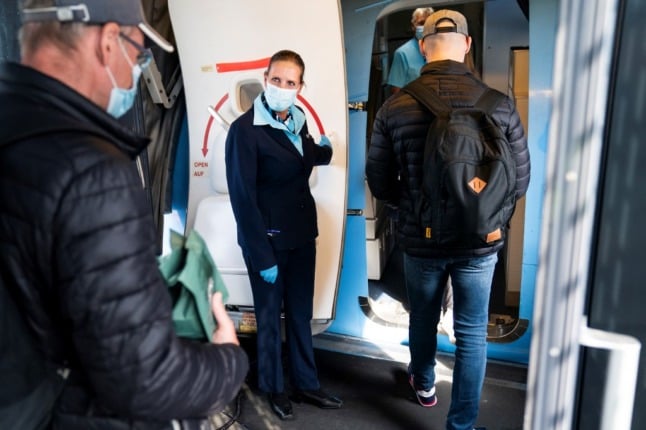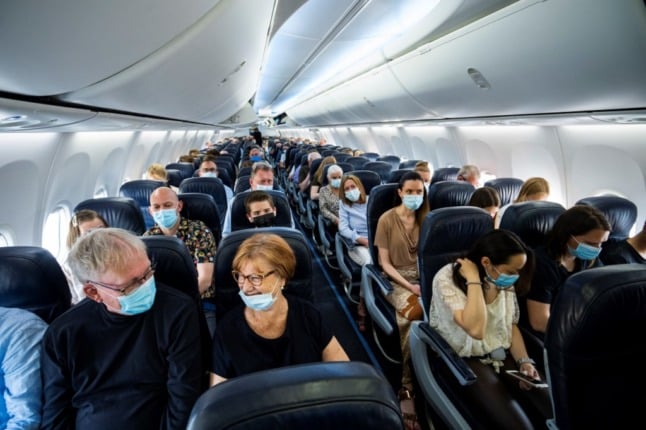The opening kicks off what many are hoping will be a busy summer tourism season in Europe as vaccine rates pick-up across the continent.
On Monday morning, with the mercury already high, tourists from Germany, Ireland and Belgium could be seen passing through the arrival gates at Malaga airport.
At least 20 international flights landed in the morning at the most important tourist gateway in the southern Andalusia region.
Visitors arriving in the sun-soaked Spanish resort of Malaga were happy to finally be able to hit the beach after more than a year of lockdown misery.
“We’re thrilled, delighted. We love Spain, the sun, the food and everything about it,” said Irish holidaymaker Gillian Ford, who arrived from rainy Dublin having had her second vaccination.
“You only live once so you need to get out of here and enjoy,” she said before heading off to the beaches of Marbella with her husband Edward.
Under the new rules, Spain from Monday is allowing visitors in from outside of the EU/Schengen Zone if they have been fully vaccinated for at least 14 days.
Non-vaccinated Europeans — who could previously enter Spain with a negative PCR test taken within 72 hours can now take a cheaper antigen test within the last 48 hours instead. They also have the option of using a recovery certificate or vaccination certificate as means of visiting Spain, which will be processed through Spain and the EU’s upcoming ‘Covid passports’.
For some, the new rules have allowed for long-overdue trips.
“I haven’t been out of Belgium for a year,” said Rose Huo, a 73-year-old Belgian who came to spend a month with her sister.
“It’s always bad weather in Belgium, it’s always raining but here it’s always sunny. We’ll still have to be very careful but it’s a start!”
Under cloudless blue skies on Marbella beach, 20-year-old Irish student Alex Walsh, who took a PCR test before flying, said he felt safe to travel given the number of people being vaccinated.
“I couldn’t wait to get here, I’m just very relieved and happy,” he told AFP, saying he was “sick of being in Ireland” and had flown in from Dublin with a group of friends.
READ ALSO:
- OFFICIAL: Vaccinated global travellers will finally be able to come to Spain from June 7th
- Reader question: Which Covid vaccines does Spain accept for international tourists to visit?
- EXPLAINED: What we know so far about Spain’s ‘Covid passports’
Hopeful for recovery
Heavily dependent on its tourism industry, Spain was one of the Western economies worst hit by the pandemic, seeing a 10.8 percent fall in its GDP in 2020.
The Spanish government has set an objective of drawing 45 million travellers by the end of the year.
But by the end of April, the country had only seen 1.8 million visitors, according to official statistics.
Regardless, those in the tourism sector are still hoping for a summer surge of visitors.
Jose Luis Prieto, president of Spain’s travel agents’ union (Unav) is hoping for a “spectacular recovery” after a punishing year.
 At least 20 international flights landed on the morning of Monday June 7th in Malaga.
At least 20 international flights landed on the morning of Monday June 7th in Malaga.
According to him, over the last few weeks tour operators in Britain, France and Germany — Spain’s three main markets — have been receiving a large number of enquiries.
Across the country, from the Costa del Sol to the Canary Islands, hotels and restaurants have reopened after months of closures, and airlines have restarted routes dropped during the height of the pandemic.
Spain will also begin allowing cruise boats into its ports again from Monday.
‘Disappointing’ UK rules
Despite Spain’s easing of measures, the United Kingdom, a huge tourism market for the country, has not yet removed Spain from its list of at-risk countries.
That means British travellers will have to quarantine on their return home as well as pay for expensive Covid-19 tests.
The British normally make up the largest contingent of tourists to Spain – in 2019 over one-fifth of Spain’s 83.5 million arrivals were from the United Kingdom.
Britain’s decision to keep Spain on its amber list was, however, “disappointing”, Health Minister Carolina Darias said.
Spain had put several measures in place to lure British tourists to its shores, such as allowing them to enter without having to present a PCR test from late May.
Against the backdrop of uncertainty, major travel operator TUI has cancelled all its flights to Spain until June 13.
London will not revisit its decision for another three weeks, losing precious time for those in the hospitality sector hoping to recover.
READ ALSO



 Please whitelist us to continue reading.
Please whitelist us to continue reading.
For me the MOST IMPORTANT question is even though I am fully vaccinated for over a month, MUST I PAY horrible rip off scandalous prices for a PCR test before I travel from Spain? to Netherlands or USA?
I know none of these questions are ever answered but I still want to know …